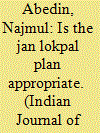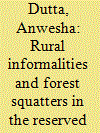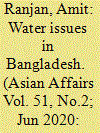| Srl | Item |
| 1 |
ID:
124501


|
|
|
|
|
| Publication |
2012.
|
| Summary/Abstract |
when ombudsman institution was first created in Scandinavia more than 200 years ago its main responsibilities were to redress general or ordinary grievances and complains of citizens against public bureaucracies / administration (not against public representatives) and to protect their rights and liberties against bureaucratic encroachment or maladministration. It was not intended to fight or investigate corruption or to look into the malpractices of the political authorities.
|
|
|
|
|
|
|
|
|
|
|
|
|
|
|
|
| 2 |
ID:
076954


|
|
|
|
|
| Publication |
2007.
|
| Summary/Abstract |
Urban sprawl has led to increasing prevalence of endangered species on military training facilities throughout the United States. Provisions of the Endangered Species Act imply encroachment interrupts military training activities and may affect military readiness. Endangered species protection and military training are competing non-market goods. This paper reports the estimates of public valuation of military training activities incorporating explicit trade-offs associated with endangered species protection. Our results suggest the public is willing to pay to alleviate conflicts between endangered species and the military. The public values for continued survival of endangered species approximately equal those for military readiness
|
|
|
|
|
|
|
|
|
|
|
|
|
|
|
|
| 3 |
ID:
160927


|
|
|
|
|
| Summary/Abstract |
It has now been well established that forests in South Asia are postcolonial political zones. In Assam, in northeast India this was accomplished through the colonial project of converting jungles into Reserved Forests. Using the politics of dokhol (“to grab or occupy by force”) as an entry point, this article examines the comparative epistemologies of squatting and informality in urban and rural contexts. My intent is to unpack the everyday practice, maintenance, and sustenance of dokhol within the reserved forests of Bodo Territorial Autonomous District. This entails an extension of existing scholarship on formal-informal dichotomies in relation to rural squatters, in particular those on forestland. I do so by combining an ethnographic study of dokhol by rural squatters with three influential strands of critical scholarship on urban squatting, namely Partha Chatterjee’s “political society,” Asaf Bayat’s “quiet encroachment,” and Ananya Roy’s take on planning and deregulation. This article advances the case of rural informalities and opens a dialogue between the two forms of informalities – rural and urban, especially in the context of South Asia.
|
|
|
|
|
|
|
|
|
|
|
|
|
|
|
|
| 4 |
ID:
172563


|
|
|
|
|
| Summary/Abstract |
At present, Bangladesh is self-sufficient in water. However, this self-sufficiency is by no means assured. Bangladesh's supplies of water are under threat through a combination of population growth, climate change, and pollution, sometimes caused by mismanagement. This article looks at the state of surface and ground waters in Bangladesh. It discusses the growing demand for water, pollution of the water bodies, and encroachment on the riverbeds, and the way in which this has been dealt with by Bangladesh's authorities. It argues that if things remain business-as-usual, it will become difficult for Bangladesh to continue with its high growth rate over the long term.
|
|
|
|
|
|
|
|
|
|
|
|
|
|
|
|